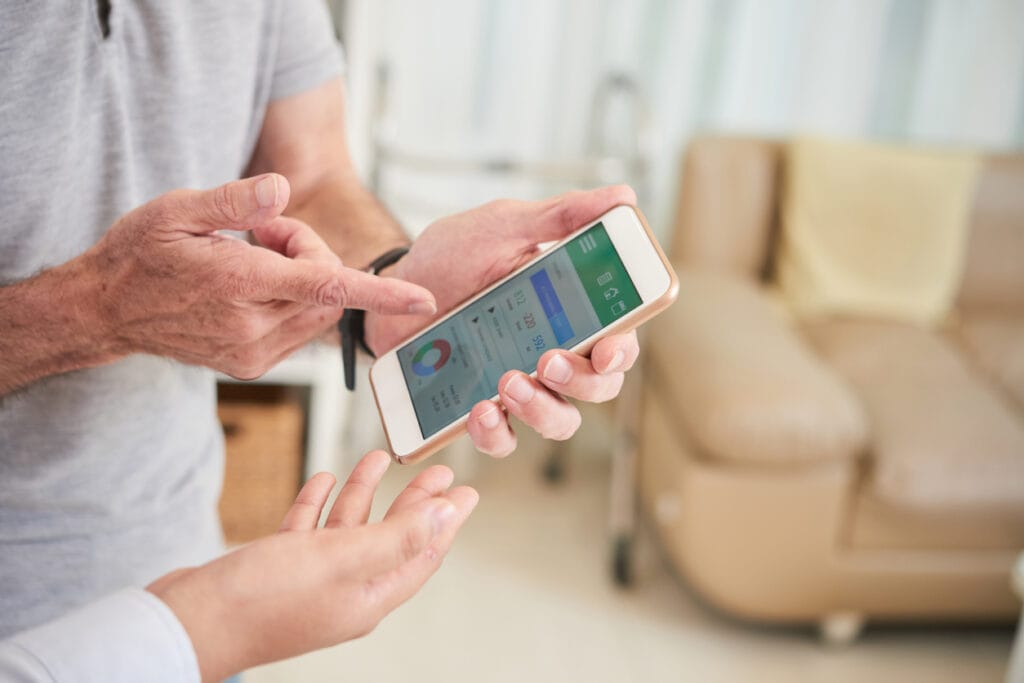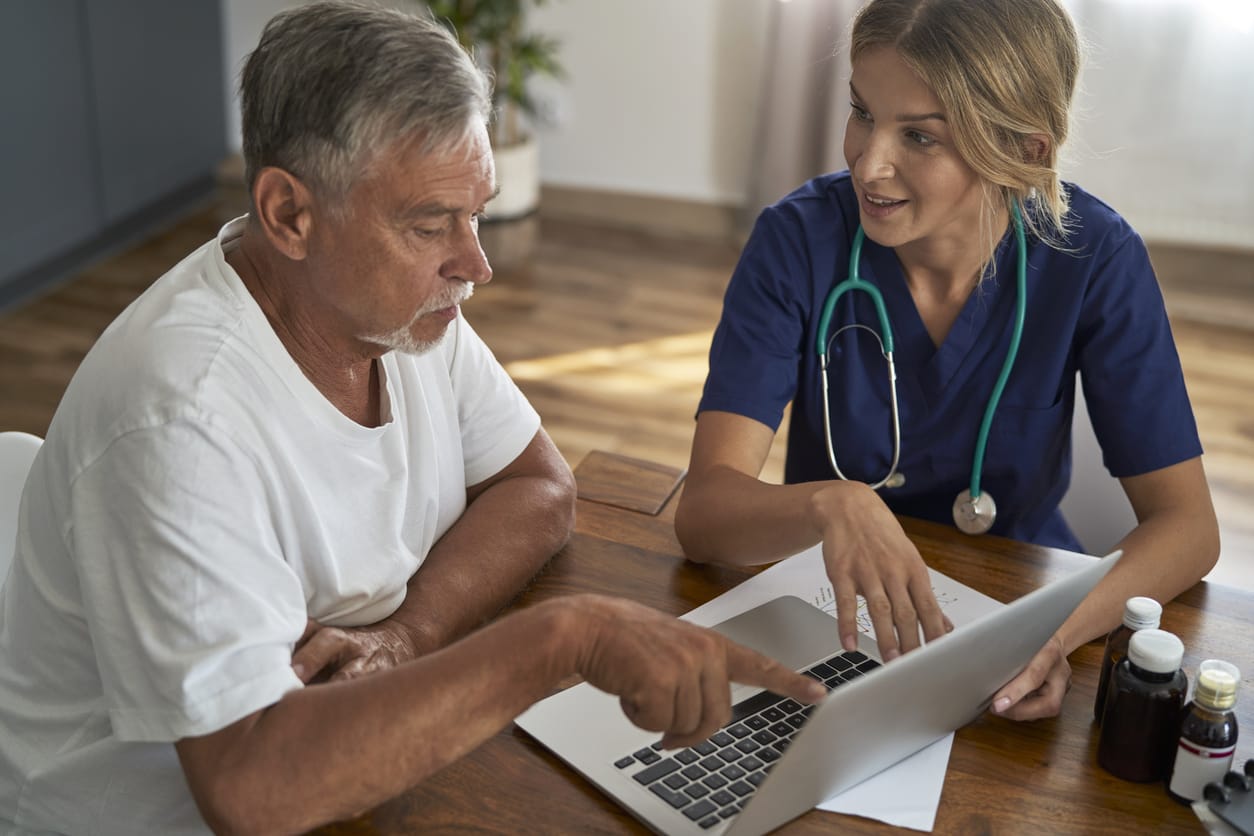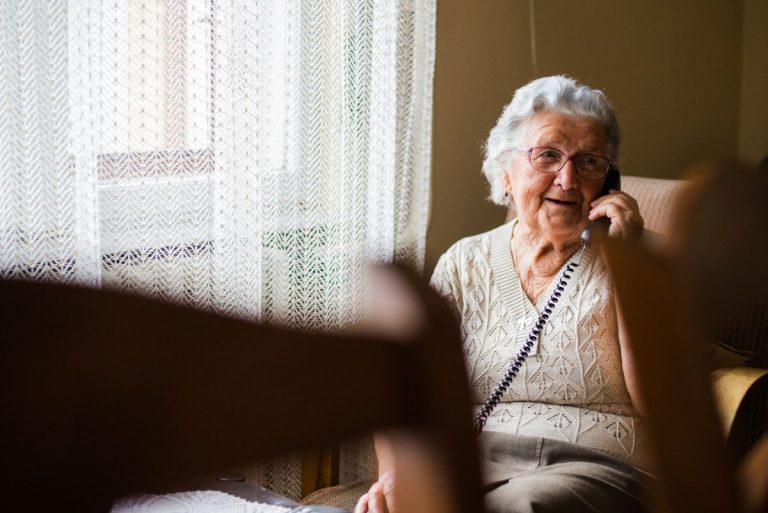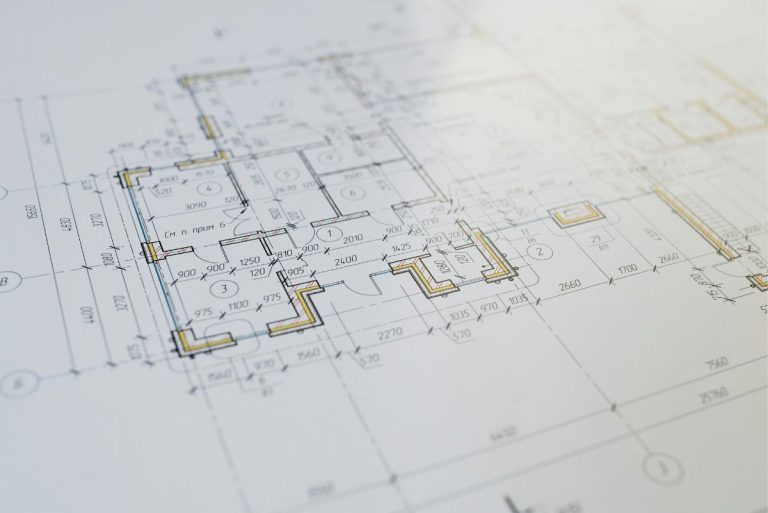Preventive health care involves proactive measures aimed at detecting and addressing potential health issues before they escalate. For seniors, this approach not only focuses on early detection through screenings and check-ups but also emphasizes lifestyle adjustments and vaccinations to prevent illnesses.
The role of technology in preventive health care has become increasingly important, offering innovative solutions to support these efforts. Embracing preventive technology in elderly care offers a multitude of benefits for both caregivers and their loved ones:
- Early Detection and Intervention: Preventive technology enables early detection of health issues, allowing caregivers to intervene promptly and prevent potential complications. This proactive approach ensures that medical concerns are addressed swiftly, minimizing the impact on daily life and promoting better health outcomes.
- Personalized Care: By monitoring vital signs and health metrics through technology, caregivers can tailor care plans to meet the specific needs of their elderly loved ones, promoting individualized treatment and support. This personalized approach not only improves the effectiveness of caregiving but also enhances the overall quality of life for seniors.
- Reduced Hospitalizations: Proactive management of health conditions reduces the likelihood of emergencies and hospital visits, contributing to overall health cost savings and improved quality of life. By preventing health crises through early intervention, caregivers can help seniors maintain their independence and comfort at home.
- Enhanced Independence: Preventive approaches support seniors in maintaining independence by managing health proactively, empowering them to live more comfortably and confidently. Technology-enabled solutions such as fall detection devices and medication reminders provide reassurance to both seniors and caregivers, promoting safety and autonomy.
- Improved Quality of Life: By focusing on prevention, caregivers foster a healthier and more fulfilling life for their elderly relatives, promoting physical well-being and emotional reassurance. These proactive measures not only address current health concerns but also support long-term wellness, ensuring that seniors can enjoy their golden years with dignity and vitality.
Health Monitoring Apps and Their Impact
Health monitoring apps are indispensable tools for family caregivers, offering both practical assistance and peace of mind.
Features of Health Monitoring Apps
Health monitoring apps designed for elderly health management boast a variety of features tailored to meet the unique needs of seniors:
- Medication Reminders: Apps like Medisafe or CareZone can schedule medication doses, send reminders, and track adherence, ensuring seniors maintain their medication schedules accurately.
- Vital Signs Tracking: Some apps like Kinsa, enable real-time monitoring of vital signs such as blood pressure, heart rate, and blood glucose levels, providing caregivers with immediate health status updates.
- Activity Monitoring: Apps like Fitbit or Apple Health can track daily activity levels, sleep patterns, and exercise routines, promoting a healthy lifestyle and alerting caregivers to any deviations that may require attention (like a sudden decrease in steps taken).
- Emergency Alerts: Many apps, including Lively and Life360, include emergency response features that allow seniors to call for help with the touch of a button, providing caregivers with peace of mind knowing assistance is readily accessible.

Enhancing Caregiver Efficiency and Senior Independence
These apps not only streamline caregiving tasks but also empower seniors to maintain independence:
- Remote Monitoring: Caregivers can remotely monitor health metrics and daily activities, allowing for proactive intervention and timely adjustments to care plans without constant physical presence.
- Promoting Self-Care: By fostering self-management through reminders and health education resources, apps encourage seniors to take an active role in their own health, enhancing their sense of autonomy.
- Peace of Mind: For caregivers, these apps offer reassurance by providing continuous updates on their loved ones' well-being, reducing anxiety and ensuring prompt responses to any emerging health concerns.
Recommended Apps for Elderly Care
Several apps have garnered acclaim for their effectiveness in elderly care:
- Medisafe: Known for its user-friendly interface and robust medication management features, Medisafe helps seniors stay on track with their medication schedules while providing caregivers with adherence reports.
- PillPack by Amazon Pharmacy: This service organizes medications into convenient packets labeled with date and time, simplifying medication management for seniors and caregivers alike.
- Life360: While initially designed for family connectivity and safety, Life360's features include location sharing, emergency alerts, and driving safety insights, making it valuable for keeping track of elderly family members.
These apps exemplify how technology can enhance caregiving practices, promote senior independence, and ultimately contribute to improved quality of life for both caregivers and their elderly loved ones.
Integrating Technology with Traditional Health Care
Integrating technology with traditional health care practices represents a dynamic approach to enhancing the well-being of elderly loved ones.
Combining Traditional and Technological Approaches
Effective elderly care often benefits from a balanced integration of traditional and technological methods:
- Holistic Care Planning: Combining regular doctor visits and assessments with data from health monitoring devices allows caregivers to create comprehensive care plans that address both immediate health needs and long-term wellness goals.
- Enhanced Communication: Technology facilitates seamless communication between caregivers, seniors, and healthcare providers, ensuring that all parties are informed and involved in decision-making processes.
- Education and Training: Caregivers can leverage online resources and telehealth platforms to access educational materials and training sessions, empowering them with knowledge and skills to provide better care at home.
Role of Health Care Professionals
Medical professionals play a crucial role in leveraging data from tech devices to optimize elderly care:
- Data-Driven Insights: By analyzing data collected from wearable devices and health apps, healthcare professionals gain valuable insights into seniors' health trends and patterns, enabling them to make informed diagnoses and treatment recommendations.
- Remote Monitoring: Continuous remote monitoring allows healthcare providers to intervene promptly in case of emergencies or health fluctuations, improving overall patient outcomes and reducing hospital admissions.
- Collaborative Care: Technology facilitates collaborative care models where healthcare professionals, caregivers, and seniors work together to achieve health goals, promoting a holistic approach to elderly care.
Challenges and Considerations
Navigating the integration of technology into elderly care presents unique challenges and considerations for family caregivers seeking to enhance the well-being of their loved ones.
Addressing Adoption Barriers
Adopting technology for elderly care often encounters several challenges:
- Technological Familiarity: Seniors may face difficulties in learning to use new devices or applications, requiring patience and simplified user interfaces to encourage adoption.
- Resistance to Change: Some elderly individuals may resist incorporating technology into their daily routines due to unfamiliarity or skepticism about its benefits, necessitating gradual introduction and clear demonstrations of utility.
- Cost Concerns: The expense associated with purchasing and maintaining devices or subscriptions can pose a barrier for caregivers, requiring careful budgeting and consideration of long-term benefits.
Data Privacy and Security
Concerns about the privacy and security of health data are paramount:
- Data Protection: Caregivers must prioritize platforms and devices that adhere to stringent data protection regulations, ensuring sensitive health information remains secure from unauthorized access or breaches.
- User Consent: Clear communication and obtaining informed consent from elderly individuals regarding data usage and sharing are essential to respecting their privacy rights and fostering trust in technological solutions.
- Regular Updates and Maintenance: Ensuring software updates and maintaining cybersecurity measures are critical to mitigating risks and safeguarding against potential vulnerabilities.
Choosing the Right Technology
Selecting suitable technology solutions requires careful consideration:
- User-Friendly Interface: Opt for devices and apps with intuitive interfaces and customizable settings that cater to the unique needs and abilities of elderly users, promoting ease of use and engagement.
- Functionality and Compatibility: Assess whether the chosen technology aligns with caregiving goals and integrates seamlessly with existing healthcare routines, enhancing rather than complicating daily care tasks.
- Seeking Recommendations: Consult healthcare professionals, support groups, and user reviews to gather insights and recommendations on effective and reliable technology solutions suited to elderly care needs.





